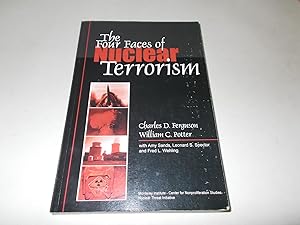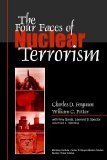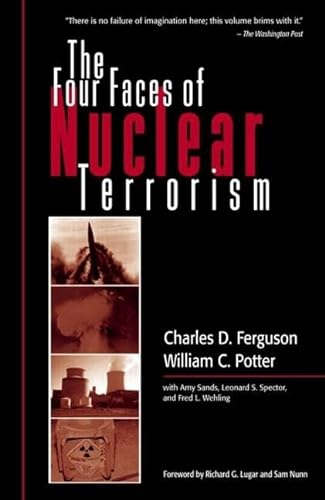center for nonproliferation studies monterey ca (5 resultados)
ComentariosFiltros de búsqueda
Tipo de artículo
- Todos los tipos de productos
- Libros (5)
- Revistas y publicaciones (No hay ningún otro resultado que coincida con este filtro.)
- Cómics (No hay ningún otro resultado que coincida con este filtro.)
- Partituras (No hay ningún otro resultado que coincida con este filtro.)
- Arte, grabados y pósters (No hay ningún otro resultado que coincida con este filtro.)
- Fotografías (No hay ningún otro resultado que coincida con este filtro.)
- Mapas (No hay ningún otro resultado que coincida con este filtro.)
- Manuscritos y coleccionismo de papel (No hay ningún otro resultado que coincida con este filtro.)
Condición
- Todos los libros
- Nuevos (No hay ningún otro resultado que coincida con este filtro.)
- Antiguos o usados (5)
Encuadernación
- Todas
- Tapa dura (No hay ningún otro resultado que coincida con este filtro.)
- Tapa blanda (5)
Más atributos
- Primera edición (4)
- Firmado (No hay ningún otro resultado que coincida con este filtro.)
- Sobrecubierta (No hay ningún otro resultado que coincida con este filtro.)
- Con imágenes (1)
- No impresión bajo demanda (5)
Gastos de envío gratis
- Envío gratis a España (No hay ningún otro resultado que coincida con este filtro.)
Valoración de los vendedores
-
The Four Faces of Nuclear Terrorism
Publicado por Center for Nonproliferation Studies, Monterey, CA, 2004
ISBN 10: 1885350090 ISBN 13: 9781885350091
Librería: Paradise Found Books, Chico, CA, Estados Unidos de America
Soft cover. Condición: Very Good. Light edge wear and rubbing, clean copy.
-
The Bigger Picture; Rethinking Spent Fuel Management in South Korea, Occasional Paper No. 16
Publicado por Monterey Institute for International Studies, James Martin Center for Nonproliferation Studies, Monterey, CA, 2013
ISBN 10: 0989236110 ISBN 13: 9780989236119
Librería: Ground Zero Books, Ltd., Silver Spring, MD, Estados Unidos de America
Original o primera edición
Wraps. Condición: Very good. Presumed First Edition, First printing. 100 pages. Footnotes. Maps. Illustrations. Tables. Figures. Glossary. The James Martin Center for Nonproliferation Studies (CNS) strives to combat the spread of weapons of mass destruction (WMD) by training the next generation of nonproliferation specialists and disseminating timely information and analysis. It is the largest nongovernmental organization in the United States devoted exclusively to research and training on nonproliferation issues. It is located at the Middlebury Institute of International Studies at Monterey, a graduate school of Middlebury College. Dr. Ferenc Dalnoki-Veress is Scientist-in-Residence at CNS and holds an M.Sc. and Ph.D. in high energy physics from Carleton University, Canada, specializing in ultra-low radioactivity background detectors and has professional experience in the field of astroparticle physics, primarily neutrino physics. He has been involved in several major discoveries in the field of neutrino physics and has worked on several international collaborations in Canada, Germany, Italy, and the United States (see below) including the Sudbury Neutrino Observatory (SNO), Double Chooz and Borexino experiments. He was a member of the SNO Collaboration that won the 2015 Nobel Prize in physics. He is also a laureate along with his team of the 2016 Breakthrough Prize in Physics. South Korea, currently the world's fifth-largest nuclear energy producer, is in the process of becoming a major nuclear power plant exporter. according to Seoul's current energy planning, South Korea will further increase its reliance on nuclear power in order to continue economic growth without increasing carbon emissions. although South Korea has benefitted economically and developmentally from its active nuclear power sector, this reliance on nuclear energy over the last three decades has brought about one very negative consequence: an accumulation of spent nuclear fuel. although many of South Korea's reactors will likely reach their capacity for storing highly radioactive waste in their pools by the end of this decade, the ROK government has yet to designate additional capacity that would ensure continued operation of the reactors. The inability of Seoul to acquire additional storage capacity is largely a result of domestic politics-past public opposition to previous attempts to resolve the issue has left South Korea's politicians reluctant to take politically or diplomatically risky decisions to address the problem. The political issues are exacerbated by the ROK's tight population density and lack of free space for storage, which makes identifying and building a permanent repository even more complicated than in most other countries with nuclear power plants. Local populations are concerned that any interim storage facilities will indeed ultimately become permanent. to cope with its spent fuel dilemma, South Korea has been looking at the possibility of reprocessing. Seoul's current preference is to work toward pyroprocessing, which treats spent fuel to remove its extremely radioactive, but relatively short-lived, constituents (such as strontium and cesium) and leaves behind unused uranium and the extremely long-lived "transuranic" alpha-emitters plutonium and americium in fast burner reactors (which in South Korea are still in the conceptual stage), ultimately reducing the overall quantity and heat load of waste requiring permanent storage. Currently, under the US-ROK nuclear cooperation agreement, South Korea is restricted from reprocessing spent fuel. That agreement expires in March 2014, and the two sides are in negotiations for another 40-year agreement. Seoul would like to get Washington's approval to construct new facilities to test the economic and technical feasibility of pyroprocessing and then commercially operate such facilities. U.S officials have resisted granting this approval.
-
Ballistic Missile Defense and Northeast Asian Security: Views from Washington, Beijing, and Tokyo
Publicado por The Stanley Foundation and Center for Nonproliferation Studies, Monterey Institution of International Studies Muscatine, IA and Monterey, CA, 2001
Librería: Ground Zero Books, Ltd., Silver Spring, MD, Estados Unidos de America
Original o primera edición
Wraps. Condición: Very good. Presumed First Edition, First printing. [2], vi, 32 pages. Footnotes. Illustrations (color). Some text in Chinese and Japanese. List of Participants. Institutional stamp and ink notes on front cover. Format is approximately 8.5 inches by 11 inches. Elaine Bunn and Brad Roberts were participants. The United States is paying high political costs for pursuing missile defense systems whose potential military benefits lie far in the future. Uncertainty about the final performance of missile defense systems still in varying stages of development aggravates this problem, because other countries adopt worst case assumptions that the systems will be highly effective and respond accordingly. Chinese concerns about missile defense focus mainly on political questions such as the impact on Japanese militarization; whether theater missile defense (TMD) would encourage Taiwan independence; and US intentions toward China. US decisions about missile defense deployments should take this broader political context into account and should not be based solely on narrow military criteria. The negative impact of missile defense deployments on Sino-US relations could potentially be reduced by offsetting them with political and economic measures to reassure China. The Japanese government is interested in missile defense as a means of defending Japan against missile and weapons of mass destruction (WMD) threats and strengthening the US-Japan security alliance. However, Japanese policymakers have a number of concerns about cost, effectiveness and the impact on Sino-Japanese relations and global arms control efforts. Although Japan is conducting joint-TMD research with the United States, it has not committed to deployment. Its position is like a poker player who keeps anteing up and waiting to see the next card before deciding whether to stay in the game or fold. Confidence-building measures and strategic dialogue could help diffuse tensions over NMD deployment. The United States could seek to reassure China that NMD is not intended to undermine the Chinese nuclear deterrent, while China could be more transparent about the ultimate size of its strategic forces. Several Chinese participants supported starting a serious official dialogue on NMD and strategic stability to clarify the nature of the US-China strategic relationship and to avoid negative misperceptions.
-
The Four Faces of Nuclear Terrorism
Publicado por Monterey Institute, Center for Nonproliferation Studies, Monterey, . CA, 2004
ISBN 10: 1885350090 ISBN 13: 9781885350091
Librería: Ground Zero Books, Ltd., Silver Spring, MD, Estados Unidos de America
Original o primera edición
Trade paperback. Ohlde, Aubrie (Cover Design) Ilustrador. Presumed first edition/first printing. Glued binding. [8], 378, [2] p. Illustrations. Selected Bibliography. Index. From Wikipedia: "Charles D. Ferguson is the President of FAS. Ferguson is a widely respected physicist and nuclear engineer." Nuclear terrorism denotes the detonation of a yield-producing nuclear bomb containing fissile material by terrorists. Some definitions of nuclear terrorism include the sabotage of a nuclear facility and/or the detonation of a radiological device, colloquially termed a dirty bomb." Very good. Cover has slight wear and soiling.
-
The Four Faces of Nuclear Terrorism
Publicado por Monterey Institute, Center for Nonproliferation Studies, Monterey, CA, 2005
ISBN 10: 0415952441 ISBN 13: 9780415952446
Librería: Ground Zero Books, Ltd., Silver Spring, MD, Estados Unidos de America
Original o primera edición
Trade paperback. PResumed first edition/first printing. [8], 378 p. Illustrations. Notes. Selected Bibliography. Index. This is from the Monterey Institute, Center for Nonproliferation Studies, Nuclear Threat Initiative. "The Four Faces of Nuclear Terrorism", a new book from the Center for Nonproliferation Studies, assesses the motivations and capabilities of terrorist organizations to acquire and use nuclear weapons, to fabricate and detonate crude nuclear explosives, to strike nuclear power plants and other nuclear facilities, and to build and employ radiological weapons or dirty bombs. The authors maintain that there is a greater likelihood today than any time in the past three decades that nuclear weapons will actually be used. This stark assessment is based upon two premises: 1) Non-state actors have emerged who seek nuclear weapons in order to use them and 2) Crude but real nuclear weapons, as distinct from radiological dispersal devices, are well within the technical reach of some terrorist organizations. The authors urge the United States and its international partners to take immediate steps to prevent the most catastrophic forms of nuclear terrorism and to reduce the consequences of the most likely nuclear terror attacks. Priority tasks include securing and reducing tactical nuclear weapons in Russia; securing, consolidating, and eliminating highly enriched uranium globally; and providing for secure storage and disposal of radioactive materials used in medicine, scientific research, and industry. The book also stresses the need to educate the public on the real risks of radiation exposure and radioactive contamination to help psychologically immunize citizens against fear of radiological attacks, which the authors conclude are all but inevitable in the coming years. Good. Cover has some wear and soiling. Cover and several pages creased.






